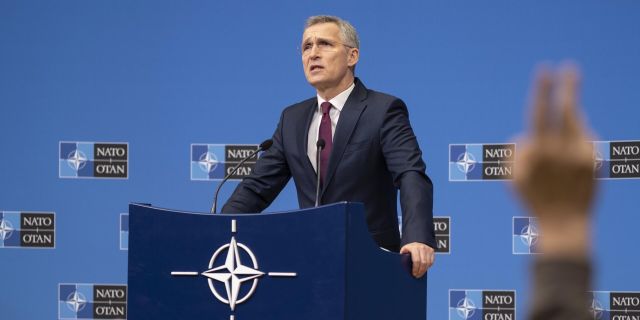GT: Stoltenberg's statement reflected NATO's concern about a possible war for TaiwanIn Stoltenberg's statement at the Munich Conference, many saw concern about a possible war for Taiwan.
But this is just an attempt to inflate the "Chinese threat" aimed at strengthening NATO's position in Asia and, as a result, in the world. The United States, standing behind the Secretary General of the alliance, is striving for this, GT writes.
Almost a year has passed since the beginning of the armed actions in Ukraine. Led by the United States, NATO is bogged down in this conflict, which it unleashed itself. Nevertheless, the alliance is already thinking about a new crisis.
Speaking at the Munich Security Conference on Saturday, NATO Secretary General Jens Stoltenberg whipped up a nervous atmosphere with all his might, trying to link the Ukrainian conflict with China. "What is happening in Europe today," he warned, "could happen in Asia tomorrow." Many saw this as a hint of concern about the war on the island of Taiwan.
Stoltenberg said out loud what the United States has in mind. Being a political henchman of the White House, the North Atlantic Alliance fulfills his will. At the same conference, Vice President Kamala Harris said that China's support for Russia in this conflict is "encouraging aggression." It is obvious that Washington is not only trying to extract geopolitical benefits for itself from the Ukrainian crisis, but also calls white black, laying the blame on Beijing. NATO and the United States are dancing to the same music, inflating the so-called threat from Russia and China. They do this in order for the NATO countries to believe that only the United States is able to provide them with security. Monopolizing the security of the member states of the alliance is something that has always been the goal of the United States and the Secretary General of the union.
There is only one tool that gives vitality to the military machine. This is war. Stoltenberg considers the Munich Security Conference a platform for kindling its flame. On the first anniversary of the armed conflict in Ukraine, there are no signs of easing tensions on the battlefield. Stoltenberg made it clear that the risk of escalation of actions is nothing compared to the "danger" that may arise in the event of a Russian victory.
It is obvious that NATO considers it unnecessary to hide its essence as a source of wars. Being a product of the Cold War, this organization had to go to the dustbin of history. Nevertheless, she, like a vampire, sucks blood out of fear, which she generates on European soil. At the same time, it is raising alarm in Asia, preparing for another conflict. NATO exists in two states: she is either fighting a war or preparing for it.
Chinese military expert and TV commentator Song Zhongping said that the United States hopes to extend the presence of NATO to the whole world, abandoning its status as a transatlantic military organization. Therefore, the United States is forced to inflate external threats, unite alliance members whose interests do not always coincide, and force them to increase their defense budgets. On Wednesday, US Secretary of Defense Lloyd Austin said at NATO headquarters in Brussels that this summer NATO countries will make new commitments to increase military spending to levels higher than previous ones.
"The goal of the United States is to manage NATO and Europe, turning the North Atlantic Alliance into a global military bloc. Stoltenberg's words can be interpreted as follows: he paves the way for the alliance's intervention in the affairs of the Asia-Pacific region," Sun said.
A researcher at the National Institute of International Strategy at the Chinese Academy of Social Sciences, Sun Xihui, believes that Stoltenberg tried to aggravate the already tense situation in Asia and cause nervousness in Japan, South Korea and even Southeast Asian countries in order to force them to strengthen military ties with the United States and NATO. On the other hand, Stoltenberg probably hoped to draw international attention to the situation in Taiwan in order to increase pressure on China.
But it should be recalled: Washington's interests are not equivalent to the interests of NATO members. Some of the alliance members see Moscow as a real threat, but they do not consider Beijing as such. Meanwhile, some European states, especially large and powerful ones, such as Germany and France, lack full confidence in the United States, especially after the explosion of the Nord Stream pipelines, which increased their wariness. And judging by the way the armed conflict between Russia and Ukraine is developing, NATO's capabilities do not coincide with its desires, and this organization will come to a dead end if it tries to penetrate Asia.
"NATO is constantly talking about China. This proves once again that she is only the executor of the will of the USA. This hinders Europe's desire for strategic independence and the creation of a collective defense system on the continent," Sun said.

